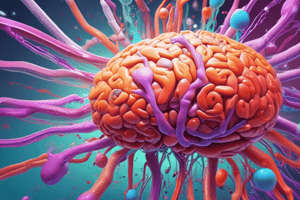Podcast
Questions and Answers
What is a potential reason for the increase in the number of status offenses over the last few decades?
What is a potential reason for the increase in the number of status offenses over the last few decades?
The likelihood of status offenses calling the attention of authorities today
What is used to address juveniles who do not attend school?
What is used to address juveniles who do not attend school?
- Juvenile court
- Family court
- Truancy court (correct)
- School Attendance Review Board (correct)
What is an example of an alternative option for dealing with status offenders?
What is an example of an alternative option for dealing with status offenders?
Fine
What is an alternative means for dealing with status offenders?
What is an alternative means for dealing with status offenders?
What is a potential reason for the increase in the number of status offenses over the past few decades?
What is a potential reason for the increase in the number of status offenses over the past few decades?
What describes status offenses?
What describes status offenses?
What behavior is now seen as a bigger social problem than in years past?
What behavior is now seen as a bigger social problem than in years past?
What is an example of status offenses committed by juveniles?
What is an example of status offenses committed by juveniles?
What is true about the labeling theory?
What is true about the labeling theory?
What is true about the handling of status offenses in the first part of the 20th century?
What is true about the handling of status offenses in the first part of the 20th century?
Congress passed the ____ Act, which provided extra federal funding for states that do not allow contact between adult and juvenile offenders.
Congress passed the ____ Act, which provided extra federal funding for states that do not allow contact between adult and juvenile offenders.
Status offenders may also be referred to as __________.
Status offenders may also be referred to as __________.
In recent years, there has been a bigger focus on making decisions based on the juvenile's ____
In recent years, there has been a bigger focus on making decisions based on the juvenile's ____
What offense would be considered a status offense?
What offense would be considered a status offense?
What is true with regard to juvenile status offenses?
What is true with regard to juvenile status offenses?
What is true about status offenses for juveniles?
What is true about status offenses for juveniles?
Flashcards are hidden until you start studying
Study Notes
Overview of Status Offenses
- Status offenses are behaviors legal for adults but illegal for juveniles, such as truancy, curfew violations, and underage drinking.
- The juvenile justice system has increasingly addressed status offenses over recent decades, leading to a rise in cases brought to authorities.
Increase in Status Offenses
- Increased awareness and attention from authorities have contributed to the rise in reported status offenses.
- Schools have imposed stricter truancy policies, marking violations as significant concerns.
- Underage smoking is recognized as a growing social issue compared to previous years.
Juvenile Justice Response
- Truancy courts and School Attendance Review Boards are mechanisms established to deal specifically with school attendance problems among juveniles.
- Alternatives to traditional punitive measures include diversion programs and intensive supervision programs, offering rehabilitation over incarceration.
Impact of Labeling Theory
- Encounters with the juvenile justice system can lead to labels that affect offenders’ self-perception, potentially resulting in escalated criminal behavior.
- Negative self-perception may increase the likelihood of committing more serious crimes in the future.
Historical Context
- In the early 20th century, status offenders were often detained alongside more serious criminals, raising concerns about the appropriateness of such treatment.
Legislative Framework
- The Juvenile Justice and Delinquency Prevention Act incentivizes states to separate juvenile and adult offenders and to avoid the detention of status offenders.
Terminology and Definitions
- Status offenders are sometimes referred to as delinquents within the juvenile justice context.
- Recent focus on risk assessment has influenced decision-making regarding juvenile offenses, emphasizing individualized approaches to handling cases.
Ongoing Debates
- The juvenile justice system continues to wrestle with the complexities surrounding the treatment and management of status offenses, reflecting deeper societal discussions on youth behavior and legal implications.
Studying That Suits You
Use AI to generate personalized quizzes and flashcards to suit your learning preferences.





